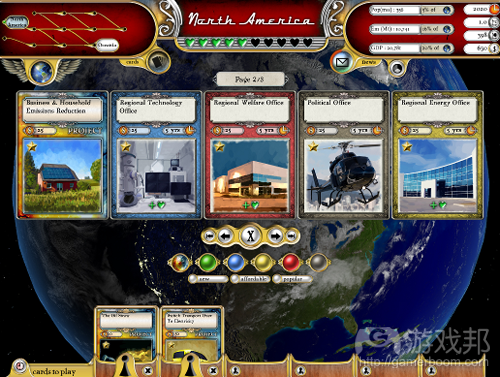游戏化产品真的具有引导性和说服力吗?
作者:Tadhg Kelly
有许多行为主义游戏设计师认为,游戏除了关卡、徽章、奖励点数以及增加用户粘性等特性之外,它们还可以作为改变社会的一种引导性工具。他们认为游戏还有不少可为其他领域所用的益处,例如教育、医疗健康、社会认知及政治问题等,所以他们想借游戏手段来引导玩家关注这些议题。
有大量此类游戏是由教育机构赞助支持,或者与慈善、社会公益组织有关。其中还有些游戏甚至是由私营企业赞助或者由天使/种子基金会资助。它们笃信如果游戏可以聚集大量用户,那么它们就可以将此法运用到其他方面,例如说服用户购买品牌商品或进行募捐。
关于游戏能够影响或说服用户的这一理念实际上在游戏诞生之初就已存在。甚至是在微型计算机(游戏邦注:例如Commodore 64或者BBC Micro计算机)问世初期,就已出现了以教育为目的而设计的游戏。当时有相当部分家长(现在依然如此)担心孩子只会用计算机玩电子游戏,所以教育市场就以此类产品让家长“安心”,让他们相信玩乐和学习并不矛盾。
劝导性游戏理念的起源在于,互动性胜过被动性,所以不少人希望通过更为成功的手段鼓励用户执行你想让他们做的事情。多数时候这个观点并没错,因为它一方面听起来确实颇具积极作用,另一方面还很有盈利性。教育和电脑培训机构奉行这一理念,一系列新兴的社会认知游戏也同样如此。如果你让某人观看世界上的垃圾产生的过程,对方有什么反应尚不可知,但如果你让他去玩一款关于清理垃圾的游戏,相信他乐意投入其中。将这种理念运用于社会工程和品牌忠诚项目等领域,这就是游戏化现象的来源。
但我认不认为多数此类游戏真的具有可行性,事实上,我还认为它们多数具有一些迷惑性。
游戏的长处
当然,游戏确实具有教育作用。《大富翁》在无意识中让玩家认识到房屋租赁、物主所有权、利率和收入所得税等概念。你在玩游戏的时候不会意识到这一点,但若干年后就会发现这些概念真的派上了用场。《Scrabble》这款拼字游戏可以让玩家轻松时刻学会拼写并积累词汇,因为这是你赢得游戏所必备的技能,但你过后也会发现正是这个游戏让你深深记住了“本质”一词的写法。扑克等一系列纸牌游戏则教会你多种解谜技能,并了解一些与概率有关的情况。《卡坦岛》扩展了你的资源管理知识,《Risk》则传授了一些地理知识(游戏邦注:有些玩家正是通过该游戏了解亚洲有个叫堪察加半岛的地方)。
游戏还可以培养人的观察力。与所有艺术形式一样,游戏世界也是现实世界的一个微型映射版本,其中也不乏幽默元素。例如,学者及游戏设计师Ian Bogost就创造了一款Facebook游戏《Cow Clicker》,该游戏的目的就是讽刺许多早期社交游戏的无聊和空洞性特点。尽管这款游戏并没有达到让人们远离这些无聊游戏的效果,但它仍存在一些能够自我立足的价值。因为玩家喜欢这款游戏,喜欢Bogost的幽默感,欣赏这款游戏的讽刺风格。
而这类游戏恰恰是在引导性这一点上缺乏作用。最常被人提及的一个成功的游戏化案例就是瑞典将超速驾车的罚金转变为安全驾车摇奖的系统。只有安全行车的司机才有资格参与这种抽奖。从本质上看,这种系统首先是具有激励性,然后才具有引导司机安全驾车,认识到自身对周围环境的影响这种作用。但遗憾的是,据报道2011年瑞典的路面交通事故死亡率仍然呈上升趋势。所以这个抽奖系统的趣味性在于它提供现金奖励,而不是因为它促使司机安全行车。
而针对是否能够让人们真正了解环境保护问题,环保游戏在此所发挥的作用同样值得怀疑,所有的Facebook社交农场游戏在此也都不幸遭遇失败。所谓的保健游戏解决方案也都在一时之热过后迅速丧失人气,并且引来了一些懒于跑步而只是热衷于赢得积分的玩家(如果可以舒适地坐在车上玩《Zombies Run》,人们何苦还要跑步玩这款游戏?)。诸多案例的结果表明,玩家一开始可能会觉得这些游戏理念很有吸引力,但这些游戏并没有极大改变他们的想法和行为。
说明力
那么为什么我之前要提到“迷惑性”一词?这里的迷惑性有两种类型。
第一种是,有不少人在这种游戏化理念中投入了大量精力,并以此谋生。在学术领域,教师需要相信游戏具有引导性,并且这一理念最终会成为现实。学术界通常是许多亚策略理念(例如交替现实游戏,以及虚拟世界的潜在益处等)的起点,多数时候这是一种调查研究的推测结果。许多人都希望游戏超越单纯玩乐的境界,并将其拔高至更为严肃的课题或是具有导向性的专著这一水准。所以在这一领域中,游戏化现象实际上带有一点自我欺骗性,他们笃信将游戏运用于学术研究终有一天会成为现实。
第二种类型主要用于推广销售。
通常,为劝导型软件付费的群体并非这些产品的终端用户。例如,《Advergames》的购买者就是一些品牌公司,他们希望通过这一软件提升自己品牌的用户粘性或知名度。还有不少广告代理商通过推出整合某些品牌故事的游戏来创收,但这类游戏极少达到其预期效果。多数情况下,这些游戏基本上无人体验,即使真有人体验了,这些用户的注意力也并不在于其推广的品牌。这也是许多游戏化奖励项目的真实情况。
与之相似,多数基于电脑的培训软件的付费者也并非终终用户。例如,传授软件技能或HR政策的计算机培训解决方案通常是由企业买来鼓励或要求员工使用的产品。但甚少人了解员工对这些产品的真正看法。
另外,教育类软件公司通常都有数十年制作可爱动物益智游戏、品牌角色游戏,以及探索历史任务冒险游戏的经验。其中多数软件并不是用于吸引终端用户(儿童),其主要购买群体是家长和学校,因为他们相信这些公司所灌输的理念,即具有交互性的东西就一定更有益于学习。虽然也有些更高明的公司确实制作了改变少儿用户生活的产品,但有更多公司推出的是一些粗制滥造,只是为了索钱的低劣软件。
趣味性
这些项目失败的一个主要原因就是,如果按游戏的标准来看,它们实在太糟糕了。它们平庸乏味,制作低劣并且运行缓慢。它们的核心系统(包括规则、操作和结果)非常有限,毫无快乐可言。它们缺乏稳健性,很容易被利用,并且用户很快就能达到自己技能的极限。
它们没有趣味(我对趣味的定义就是,掌握公平游戏机制而获胜的乐趣)。但是,《Fate of the World》这款关于气候变化和资源危的多赢模式游戏却是一个例外。《Fate of the World》是一个小型而极具积极性的成功案例。其开发者最近还推出了一个扩展内容包《Tipping Point》,并持续创建该游戏的新内容。
《Fate of the World》与其他多数温室效应题材游戏的不同之处在于,前者并没有说服用户的意图。它的确有点呆板并缺乏通俗性,但它并没有采用填鸭式的说教方式来引导用户。它也没有让用户为得分而去点击一些显而易见的解决方案(游戏邦注:这是许多意在唤醒大众社会意识的行业主义游戏的通病),或者过度奖励用户的某些正确表现。
《Fate of the World》是一款模式游戏,它具有吸引力,也很困难,鼓励人们采用策略性的思维来解决问题。用户很可能失败,被难题所困,或者意识到某些你所忽视的因素后来可能成为获胜的关键。用户可以自由组建其中的世界,游戏也有足够的深度来展现有趣的结果。与《大富翁》一样,你可以通过游戏在无意中学到一些知识。你不会被说教内容所扰,只要专注于玩游戏即可,它更可能教会玩家一些有用的知识。(本文为游戏邦/gamerboom.com编译,拒绝任何不保留版权的转载,如需转载请联系:游戏邦)
Are Games Really That Persuasive?
Tadhg Kelly
Saturday, November 10th, 201218CommentsEditor’s note: Tadhg Kelly is a game designer with 20 years experience. He is the creator of leading game design blog What Games Are, and consults for many companies on game design and development. You can follow him on Twitter here.
Beyond the levels, badges, reward points and promised engagement increases, there are many behaviourist game designers who see games as persuasive tools for social change. They see a very wide range of possible benefits from games, such as education, health and awareness of social or political issues and so they want to use games to persuade players.
A large portion of these kinds of games are either funded by or affiliated with academic institutes. Others are related to charities and social-cause groups. Some of them are even funded through private enterprise or by angel/seed funders in search of venture capital. Often the pitch is that if said game can build a critical mass of users around it then it can be leveraged to do something else, such as buy branded goods or contribute to causes.
This idea that games can influence or persuade has actually been around almost since their inception. Even in the early days of micro-computers (such as the Commodore 64 or the BBC Micro), many games were produced for educational purposes. There was (and still often is) a worry on the part of parents that their children would only ever use computers to play video games, so the educational market convinced them that fun and learning could go together.
The root of the persuasive-game idea is that interactivity is better than passivity, and so by encouraging users to do stuff you likely imprint them with an idea more successfully. Largely this is assumed to be true because it sounds very positive on the one hand, and something that could be profitable on the other. The educational and computer-based training sectors rest upon it, as do the emerging fields of socially conscious games. If you show a man a movie about the buildup of trash around the world that’s one thing, but if you get him to play a game in which he cleans it up, he’s more likely to care about it. Apply the same thinking to everything from social engineering to brand loyalty, and that’s where gamification comes from.
But I’m not convinced that most of this stuff really works. In truth, I think most of it is a little deceptive.
What Games Do Well
Of course games can educate. Monopoly accidentally teaches its players about ideas like property rental, ownership, rates and income taxes. You don’t really realise it, but years later these ideas turn out to be useful. Scrabble teaches spelling and vocabulary without ever making a big deal of it. It’s just the skill you need to win the game, yet later you find that for some reason it’s imparted you with the knowledge to spell the word “quiddity.” Poker and a variety of other card games teach you various puzzle-solving skills and the beginnings of understanding probability. The Settlers of Catan expands your understanding of resource management. Risk teaches geography (every Risk player knows that there’s a place in Asia named Kamchatka).
Games also have a long and storied history of wry observation. Like all forms of art, a game world is always a warped reflection of the world around rather than a true reality, and this offers much opportunity for humour. Noted academic and game designer Ian Bogost created a satirical Facebook game named Cow Clicker, for instance, whose purpose was to satirise the dull stupidity of many early social games. Arguably it did not have the effect of turning people away from those supposedly dull games, but it became something in its own right instead. Players liked it, liked Bogost’s sense of humour and continue to appreciate the satire on its own terms.
Where games seem to fail is in actually being persuasive. An oft-cited example of successful gamification is a system in Sweden which turns the amounts taken in fines from speeding drivers and turns them into a prize lottery. Only safe drivers are eligible to win that lottery. In theory this system is supposed to first incentivise and then persuade drivers to drive more safely, becoming more aware of their own impact in their surroundings. But, alas, according to this report the rate of deaths on Swedish roads in 2011 was actually on the increase. The Swedish speeding lottery is interesting because it offers a cash prize, not because it makes drivers think more about speed.
Environmental games have questionable impact on whether users actually become more conscious of those issues, and all of the Facebook social farm games failed miserably. Health gaming solutions lose lots of players after an initial buzz, and are often cheated by players who love points but hate to run (Why actually run to play Zombies Run when taking the bus works so much better?). In these and many other cases the result seems to be that players might find the idea initially attractive, but the games don’t have much effect on changing their minds.
The “Persuasion” Story
So why do I say “deceptive”? Well there are two types.
The first is that there are quite a few people who have invested their time and careers in this whole idea. In academia particularly there is a great need among teachers to believe that the idea that games can be persuasive will eventually come true. Academia is usually the starting point for many meta-game ideas, from alternate-reality gaming to the supposed benefits that virtual worlds would bring, largely as a result of extrapolations on research. A lot of folks want games to get beyond a phase of merely being fun, and equate that with adopting more serious topics or a directed sense of authorship and stewardship. So there’s an element of self-deception involved in the hope that it will one day be true.
The second type is the story told in search of a sale.
Oft times the people actually paying for persuasive software are not its end-users. Advergames, for example, are bought and paid for by brands hoping to increase engagement or awareness through giving users something to do. And there are plenty of agencies who will happily take that money and deliver them a game that fits that story, but rarely has its intended effect. What tends to happen is that the game is not played, or played but not much attention is paid by users to the brand that paid for it. This is also the emerging reality of many gamification award schemes.
Similarly, most computer-based training software is not bought by its end users. A CBT solution to teach software skills or HR policies is something that a company buys in and then encourages or forces its employees to use. What employees actually think of it is often irrelevant.
Likewise, educational software companies have a decades-long history of making cute animal puzzles, branded character adding-up games and quest-into-history adventure games. The vast majority of said software does not engage its end users (children) to any great degree. But the people who buy it are parents and schools, and they are sold on the idea that if it’s interactive it must be better. While some noble companies strive to really make a difference in youngsters’ lives, there are plenty of others for whom cranking out this sort of software is just a means to a paycheque.
Find The Fun, Lose The Agenda
The primary reason why these projects fail is that they are terrible as games. They are trite, earnest, cumbersome, badly engineered and slow. Their core systems (the rules, actions and outcomes) are limited and have no sense of delight. They lack robustness, are very easily exploited as a result, and the user reaches her maximum mastery very early.
They’re just no fun. (My definition of fun is: The joy of winning while mastering fair game dynamics). On the other hand, there’s Fate of the World. A multiple-award winning game about climate change and resource crises, Fate of the World is a small-but-passionate success story. Its developers have recently launched an expansion pack named Tipping Point, and continue to build it out.
The difference between Fate of the World and many socially conscious greenhouse-effect games is that Fate is not trying to persuade users of anything. It’s nerdy and inaccessible, sure, but does not treat its audience like spoon-fed gibbons. It does not invite them to click on obvious solutions in the service of making a point (as many socially conscious behaviourist games do) or give forced-cheer award points for users behaving well.
Rather, Fate is a simulation. It’s absorbing, difficult and invites strategic thinking. It’s perfectly possible to lose, to get stuck or to realise that certain factors you had been ignoring are actually pretty important to success. You are welcome to screw its game world up however you like, and the game is deep enough to make the results of doing that interesting. And so, like Monopoly, you accidentally learn some stuff while you do. By avoiding preachiness and just focusing on the game, Fate is much more likely to teach players useful lessons.
They don’t have to be persuaded of anything.(source:techcrunch)









































 闽公网安备35020302001549号
闽公网安备35020302001549号